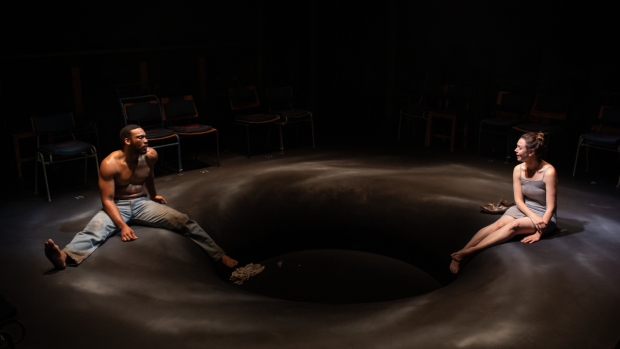Statements After an Arrest Under the Immorality Act at the Orange Tree Theatre – review

© Helen Maybanks
Dating from 1972, when South Africa was still in the grip of apartheid and before Athol Fugard's international reputation as that country's preeminent dramatist had been cemented, [[Statements…[[ emerges as a grim snapshot of forbidden love and its consequences under an oppressive, uncaring regime. Etched in disillusionment and suppressed fury, Fugard's script is a mixture of raw monologues and jagged duets that are tantalisingly vivid in one moment but dramatically inert the next.
Shaq Taylor and Scarlett Brookes are Errol and Frieda, a South African couple whose love affair is illegal simply because he is Black and she is white. Absurd as that may seem to a 2021 metropolitan audience, it was the horrible reality in the climate when Fugard wrote this play, and if its power to shock has diminished, its sense of outrage and understated misery certainly has not. There is a stark poetic beauty in the text, although some may find the relentless dourness hard to swallow.
Diane Page's tense, terse production has a vivid sense of time and place, enhanced by Esther Kehinde Ajayi's subtle but relentless sound score, and skilfully locates a tone for the play at the axis of despair and erotic ecstasy. If it feels entirely humourless, the argument surely is that there is nothing remotely amusing about racism and inequality: the future for this couple looked bleak even before they were shopped to the authorities. If one is grateful that this uneasy piece lasts a mere 75 minutes, reflect also that we as an audience are lucky enough to have the option of walking away from this sadness and injustice; Errol, Frieda and their ilk had to, and in some areas of the globe, still have to, live under it.
Taylor is astonishing as Errol, bringing dignity, fire and a thrilling, expressive physicality to this highly intelligent, sensitive man whose ambition and joy is thwarted by being born in the wrong place at the wrong time. His performance alone would justify a trip to Richmond. Opposite him, Brookes gives Frieda a convincing melancholic resignation that haunts, despite an occasional tendency to swallow her lines. Richard Sutton provides jolts of malevolent energy in the somewhat thankless role of the Detective Sergeant on their case.
Page's staging is unfortunately painted into something of a corner by Niall McKeever's striking but cumbersome in-the-round set design. A giant hole or pit in the centre of the Orange Tree's circular stage, it serves as a useful metaphor for the vortex of despair, evil and segregation that will ultimately whirl away any chance the characters have of happiness and union, it is only seldom inhabited by the actors and frustratingly limits the playing space as they totter around it. If the intention is to give a sense of constant tension, then it's successful, but it makes for tedious blocking, and frequently ruins the sight lines – at least on the lower level – unless you're in the very front row. Rajiv Pattani's lighting goes from atmospherically murky to flashbulb-bright blinding in the blink of an eye, and feels entirely appropriate.
Ultimately, Fugard wrote richer, more nuanced and accomplished plays than this one, but there is still a deep well of feeling here and a sense of the tragedy of hope extinguished that stays with the viewer long after the short performance is done. Diane Page hasn't re-introduced a masterpiece but she's providing a welcome opportunity to reappraise a slice of unhappy, unfair life that still resonates, albeit only with fitful power. I admired it more than I enjoyed it.










